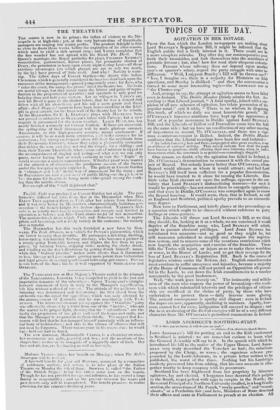AGITATION IN HER DOTAGE.
FROM the fuss which the London newspapers are making about Lord STAN LEY'S Registration Bill, it might be inferred that the
English public feel a lively interest in it. There could not be a more complete mistake. Day after day our contemporaries pour forth their broadsides, and lash themselves into the semblance or patriotic fervour ;" but, alas ! how few read their eloquent exborta.
dons. Persons whose solvency does not depend upon another year's or quarter's salary, regard the party struggle with utter in. difference. " Welk I suppose Stanley s Bill will be thrown out?" " Yes, I imagine so ; • there is a majority for Ministers on Irish questions, and Stanley is disliked : " and then the conversation is turned to some more interesting topic—the TA MRURINI row or " the Chester cup."
And, strange to say, the attempt at agitation seems to have failed CVC11 in Ireland. The Dub/in Monitor plainly admits the fact. Ac.
cording to that Liberal journal, " A fatal apathy, joined with a sus
picion of all new schemes of agitation, has taken possession of the popular mind:" and it adds " There is no wisdom in disgeisieg this truth, of which we daily see most lamentable proofs. Mr,
O'Coxma.r.'s immense exertions have kept up the appearance at least of a popular movement in Dublin against Lord STANLEY'S
Bill, and the Liberals of Belfast and Downshire came into the field on the same side ; but we have no recollection of any other meeting of importance to second Mr. O'CoNsirax, and there was a vigorous counter-movement in Belffist. Indeed, the Dublin Monitor confesses that the Liberal meetings have been few and isolated " An isolated meet i here and there, congregated after great exertion, it 110i au evidence of' national activity. Theymerely indicate how dead the people have become to questions vitally Effecting their own interests, when, in such a momentous crisis, the movement is so partial—so exceedingly sluggish."
One reason, no doubt, why the agitation has failed in Ireland, is Mr. O'CONNELL'S determination to connect it with the unreal project of Repeal. But nobody knows better than O'CONNELL, whom Repeal would alienate or whom it would attract ; and had Lord STAN LEY'S Bill itself been sufficient for a popular demonstration, he would have trusted to it alone for rousing the Liberals. How little value Irish electors set upon the suffrage, appears in the certainty that Lord STANLEY'S disfranchising measure—for such it would be practically—has not roused them to energetic opposition; and that even in Dublin, O'CteetatEte was compelled again to renew the Repeal humbug. It would seem, then, that in Ireland, as well as England and Scotland, political apathy prevails to an extraordinary degree. Now turn to Parliament, and briefly glance at the proceedings on a question which ought to be discussed without reference to party feelings or consequences. The Liberals will throw out Lord STANma's Bill, as we think they should; for, looking at it as a whole, we are convinced it would deprive of the franchise many who, Lord STANLEY will admit, ought to possess electoral privileges. Lord JOHN RUSSELL has introduced two measures—not so good as they might be, but still measures calculated to simplify and cheapen the registration system, and to remove some of the vexatious restrictions which now impede the acquisition and exercise of the franchise. These bills the Tories will reject, or injure so as to make them worthless or worse, in the House of Lords; and so get their revenge for the loss of Lord STANLEY'S Registration Bill. Such is the course of legislative wisdom under the Reform Act. English constituencies must continue to suffer annoyance and injustice, because a majority of the house of Commons will not permit an Opposition all-powerful in the Lords, to cut down the Irish constituencies to a number manageable by the great landowners. Well, "the work goes bravely on." The insincerity and selfishness of the men who engross the power of lawmaking—the readiness with which substantial interests and the privileges of eitizenr ship are sacrificed at the shrine of' party, by those who have undertaken to protect them — daily become more glaring. The natural consequence is apathy and disgust : even in Ireland the dupes are now, apparently, declining in numbers. Apathy, however, cannot Let for ever; indienation will succeed to disgust ; and the next awaken ing of the Begsh energies will be of' a very different character front Mr. O'Cos-mem.'s periodical commotions in Ireland,


























 Previous page
Previous page